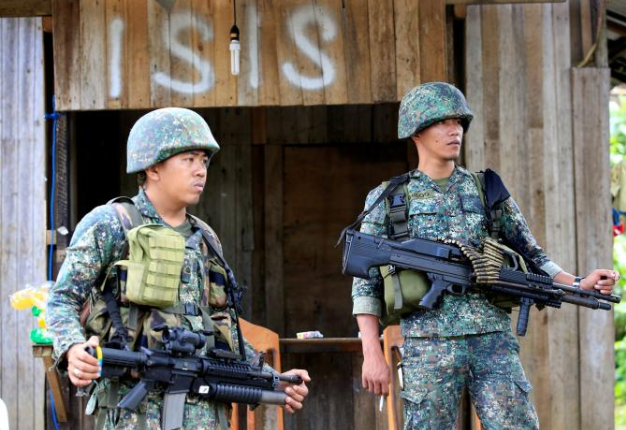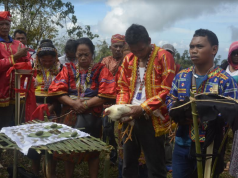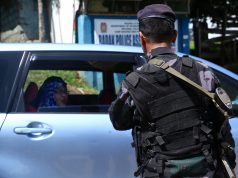
MANILA, Philippines – The military is unsure if it would be able to meet the three-day deadline imposed by President Rodrigo Duterte to get rid of terrorists in Marawi City.
Armed Forces spokesperson Brigadier General Restituto Padilla on Monday said meeting the deadline by Tuesday, June 6, would be based on the assessment of those on the ground.
“The basis for determination of any military action on the ground will be the call of the commander. They are the ones who are fully aware of the situation,” Padilla told reporters.
“Complications have been coming out. And complications, what we mean by this is the continued use of civilians, potential hostages that may still be in their hands – the use of places of worship for one which prevents us from going all out and other factors that complicates the battle,” the military spokesperson added.
On Saturday, Duterte promised that by Tuesday, government forces would be able to quash Marawi’s takeover by members of the Maute and Abu Sayyaf groups.
But presidential spokesperson Ernesto Abella said on Monday that while “the President has promised to end the Marawi conflict within the shortest possible time,” his vow was “consistent of course with due regard for the protection of innocent lives and avoid of abuses.”
On Sunday, thousands of civilians hoping to flee fighting in Marawi remained trapped after a four-hour truce to evacuate residents was disrupted by gunfire. Only 134 were freed on Sunday, less than on previous days, despite government hopes that more than 1,000 would be able to leave a city battered by 13 days of intense fighting.
Last Friday, Padilla said rebels had continued to “occupy commercial buildings as their defensible enemy lairs,” which he said “is the subject of military action being conducted for the past few days until now.”
Earlier, Defense chief and martial law administrator Delfin Lorenzana said government troop movements in Marawi were being hampered by difficult enemy terrain and rebels who frequently moved and changed positions within concrete houses and other structures that were close to each other.
“They are actually holed up in reinforced buildings. And pati ‘yong mga kanyon natin parang hindi tumatalab eh. So ‘yon ang hirap doon [And even our cannons don’t seem to take effect. So it’s difficult there],” Lorenzana said on Thursday.
“(I)t is a built-up area and kung minsan ‘yong line of fire ng ating mga kanyon hindi rin makita dahil na-o-obstruct ng ibang building ‘yon eh [It is a built-up area and there are times we can’t see our cannons’ line of fire because it’s being obstructed by buildings],” he added.
Also, according to residents, enemies can easily get off the hook because they have built tunnels as escape routes. The Defense chief likewise said Maute “have so many snipers around shooting at our soldiers” and mosque were also being used as “nests” of these snipers.
Worsening problems in troop movement is the Maute Group’s use of civilians, including children, to deter attack by government forces.
“Compounding the situation on the ground is the use of these forces, these armed elements, of children and civilians as human shields,” said Padilla.
20 more foreign terrorists aiding Maute
On Monday, during a separate press briefing in Lanao del Sur capitol building, Armed Forces Western Command chief Lieutenant General Carlito Galvez, Jr. said there were 20 more alleged foreign terrorists aiding Maute rebels in fighting against government troops in Marawi.
Galvez said this was in addition to the eight other foreign rebels from Malaysia, Indonesia, Saudi Arabia, Yemen, and Chechnya believed to be members of ISIS, who died during earlier clashes with the military.
The foreign terrorists were able to enter the Philippines during the Ramadan period, according to Galvez.
Meanwhile, the Westmincom chief denied reports quoting Indonesian Defense Minister Ryamizard Ryacudu that there were about 1,200 ISIS operatives in the Philippines, who came from Indonesia. Galvez said these ISIS terrorists went to Syria.
For his part, Padilla said “the revelations” of the Indonesia defense minister “is something that came as a surprise to us because as was mentioned by senior defense officials, in truth, we don’t have those numbers.”
He said the claim of the Indonesian official “needs to be subjected to inquiry. “We may address this because we have networks with the nations who are fighting against terrorism.”
Padilla added that Maute rebels might have been reinforced by “sympathetic individuals and groups” whose numbers could have “swelled” because of the “release of the prisoners from the city jail.”
“So this was something that we are mentioning all along as potential sources of warm bodies,” he said.









